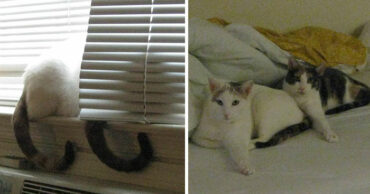
It’s hard to pick a favorite moment of when The Simpsons would reference another show, celebrity, or movie. There’s just too many to choose from. However, since Twin Peaks is upon us I wanted to remind you all of a scene in which Homer was watching the show. It’s from the episode “Lisa’s Sax.”
This reddit user description of Twin Peaks sums up this 23 second clip best:
Lynch & Frost, who created the show, once described it as “a soap opera that gets its head bashed in with a pipe.”
In 1990, serialized week-to-week dramas with a defined story arc weren’t really a thing, and the network actually fought Lynch begging him to not attempt one. Which did make sense, really: without box-sets or streaming services, you either have to watch from the pilot and never miss an episode or you’re screwed, there wasn’t a good way to catch up on shows.
The only things that were serial were soap operas; what we now call a serialized drama (that is, a drama where each episode follows on from the previous, like Game of Thrones, rather than being a new plot like CSI) was called ‘soap opera format.’ The distinction is that a soap opera is ‘open-ended’ — it’s not moving from a beginning to an end, it’s a hamster wheel of character relationships.
At the time, primetime soap operas with 1 episode per week, like Dallas and Dynasty, were huge. Twin Peaks was a show created in a very similar format, and it uses a very soap-ish setting, with a large cast of melodramatic performances, where virtually everyone has a secret life and speaks in grandiose monologues, etc ( the scene where Major Briggs spends 5 minutes describing his dreams to his weeping silent son). It was marketed and approached like another primetime soap. And it plays on a lot of soap opera cliches like living double lives, evil twins (Laura/Maddy), and constant affairs.
The ‘twist’ — the pipe bashing in its head — was that Lynch & Frost wanted to inject some elements to disrupt the soap opera format and turn it into something else (Frost describes it as a “bait and switch” show). Soap operas exist in this mildly surreal world where everything is melodramatic, mysterious and scandalous, full of cheating and murder and secret lives, but nothing is ever too dramatic or intense and nothing seems to have real consequences.
So Twin Peaks does 3 things to mess that up. Firstly, Laura’s death is played far more gravely and seriously than a soap opera would do it: she is raped throughout her childhood, becomes seriously mentally ill, and is murdered in front of her friend (who is also raped and tortured), and no one just writes it off as a weird mystery, her parents totally lose their minds from it and it results in an actual serious investigation that doesn’t go away. Secondly, Cooper comes to town with a relatively subtle and realistic performance more suited to a traditional drama, and he interrupts the show’s style by actively pointing out the weirdness of the town and unraveling everything, applying consequences to people: as odd as Cooper himself is, he is dragging the soap world of Twin Peaks down to reality. Thirdly, that’s balanced by the casually-surreal unrealistic aspects of the soap format being pushed into seriously-surreal territory.
This is all amplified by explicitly setting up a beginning (Laura is killed and Cooper arrives int own), an endgame (who killed Laura?), and a progression (a slowly building case). Now you pretty much had to watch every episode or you’d be lost.
To showcase the contrast and self-awareness, at multiple times in Twin Peaks the characters watch a soap opera on their TV, which often parallels in some way what is happening on the show. Lynch brought up the idea of having the soap-y characters glimpse cameras in mirrors and later see themselves on TV, which was shot down as too surreal (he later did something like it in Inland Empire).
The whole show is Lynch and Frost playing with the soap opera format. Note here that the original plan was to stretch the Laura investigation over a ~100 episode run. ABC were really unsettled by it and forced them to reveal Laura’s killer much earlier than that (I think it’s episode 17 or 18) and then switch to something new, so fresh viewers could jump in without needing to go watch a backlog. The reason the show is coming back is because serial dramas are A-OK in the 2010s and Showtime said “you can do literally whatever you want in that respect.” This time he says he just shot one giant 18 hour movie and cut it into hour slices.
 Follow Us
Follow Us





